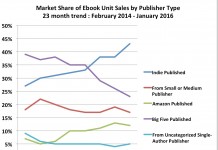Writing is a solitary craft, and many writers seem to be less outgoing than the norm. For such people, self-promotion is a nightmare. They see it as little more than boasting, which I suppose it is. Sometimes, in desperation, the writer crosses the line from boasting to begging, and then it’s even more painful to behold.
In theory, especially in the past, the publisher relieved the writer of this unpleasant chore. The writer might have been expected to do the odd reading, or bookshop signing, or – if he or she were at least semi-famous already – make an appearance on radio or TV. But the bulk of the puffing was done by a publicity manager, typically an extrovert who saw nothing wrong with hyperbole. In practice, nowadays, publicity budgets tend to get spent on authors who are already successful: the money is used to retrieve an inflated advance. B-list authors are expected to promote themselves.
Writers should write; publishers should make things public. The imminent collapse of traditional publishing has changed all that. What hasn’t changed is the underlying need of readers to find new talent and for new talent to be given a chance.
In a TeleRead article in October 2008 I suggested one solution, in the form of a dedicated ebook-review site, but now I can’t see that ever getting off the ground. Each ebook distributor (e.g. Amazon, Sony, Apple) has its own set of reviews, on its own site, put up by readers who just happen to use a Kindle, or a Reader, or an iPad. Yet more reviews are scattered all over the Web, at Smashwords, on blogs and boards and social networking sites like Goodreads.
The number of new ebook titles is growing at an explosive rate. Buried in all the self-deluding dross are some really good books – but how is the reader to find them?
For the sake of what follows, we’ll take Amazon as an example.
Books are already ranked there, and that’s fine, but I propose a ranking system for authors as well. Part of this would be an option for a reader to ask to be notified of an author’s next book. The notification could take the form of an email automatically generated when the book-file goes live at KDP. It would contain a link to the new book’s page. Or Amazon could simply send a sample to the reader’s Kindle without further ado. The reader should at any time be able to withdraw permission to be notified about any or all authors, and will need assurances about privacy.
The more notification requests an author racks up, the greater will be his or her ability to satisfy and intrigue readers. Data about the number of reviews posted for that author and their star-ratings, “likes”, etc., could be added to the mix, together with an indication, like a tag-cloud, of the genre or genres the author’s books are in.
The rankings could then be organized in various ways. Overall movers and shakers, who’s hot and who’s not in each genre, who has the highest-rated reviews per book, who’s popular in which country – the details need to be worked out by someone more computer-savvy than me, but you get the idea. A wonderful new writer with only one book would at least get a chance to be noticed.
All this would cost money to implement, but Amazon would be amply rewarded by the increase in sales and loyalty. Notified readers could even be offered a discount, or an exclusive opportunity to read the book before the official publication day. There are all sorts of possibilities, and I must say that Amazon, in particular, would be brilliant at exploiting them.
However, any of the distributors could take up the baton. Indeed, it would give them an edge against Amazon’s dominance of the market. If they all used author-rankings, readers would have a much easier time in finding new books.
As for the writer, he or she would have more time to write. This alone would improve the quality and quantity of the work, but there would also be an incentive to become technically educated, which many beginners are not. For the new novelist this means learning about story structure, dialogue, viewpoint, and all the other skills that must be mastered to make a novel come alive. It also means learning to be professional with respect to editing and presentation: readers don’t like typos and bad covers any more than they like cardboard characters and wooden dialogue.
The net effect would benefit everyone – reader, author, distributor. We would be taking a decisive step away from the capricious and often mistaken judgments of the traditional and self-appointed gatekeepers, and allowing, at last, true merit to rise.
[Via Richard Herley’s blog]



































All very logical and rational, Richard. However it is missing one key factor, imho of course.
Reviews are not worth sh1te when it comes down to it. A review is a subjective, personal taste, thing. You might love a title and I will absolutely hate it. I read reviews hereabouts all the time. I have purchased several titles on the basis of those reviews and didn’t like any of them.
What matters is the connection between reviews and individual readers. This is why social reading sites are doing well and imho are the future for finding our reading.
I believe we can only ‘mine’ reviews by following specific readers who’s taste we share. So we need to lock on to readers that love a title we loved, and then explore other titles they also loved … and so on.
I don’t have any problem identifying novels that I want to read: my problem is getting access to them, since most are still under copyright and apparently unrenumerative to reissue. Once that problem is solved I have enough unread books lined up to last me the rest of my life. And labelling an author as ‘hot’ is a clear sign to me that this is someone unreadable and turgid who should be kept well away from.
Choice is only a problem when you have a limited number of options. With hundreds of thousands of free and affordable books becoming available, people who need someone else to tell them what to read really aren’t worth bothering with.
I’d really like to see the new-book alerts happen. Fictionwise had them: you simply ticked a box saying “Alert me when a new book is available from this author” (or similar) and you’d get an email. You could edit this “favourite author” list on your account page.
I can’t work out why major ebook sites don’t do this. True, Amazon has “New for you”, but you have to go to your Amazon webpage to see it. In my experience, nothing sent me straight to the purchase page faster than an email saying one of my favourite authors had a new book out, available for me to buy.